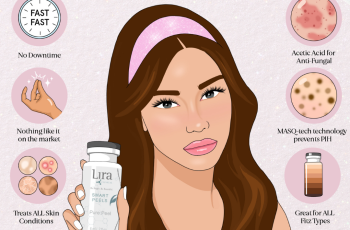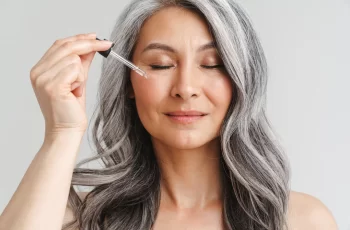
Can You Use Vitamin C With Retinol?
Vitamin C and retinol are probably two of the most potent and tricky skincare ingredients to use in your everyday skincare routine. With vitamin C often becoming oxidised, especially when it isn’t stored correctly once opened, and retinol causing its usual side effects of dryness and flaky patches. I wouldn’t blame you for having doubts about teaming these ingredients together, but that is exactly the aim of today’s blog post as I hope to answer whether you can use vitamin C with retinol.
Can you use retinol and vitamin C together?
Yes, it is considered OK to use retinol and vitamin C in your routine, there are three ways to combine retinol and vitamin C.
Take a look below and decide for yourself which would be the most effective way of using them. I would also suggest if you had any further concerns to seek the help from a medical professional or dermatologist.
Use vitamin C in the morning and retinol in the evening
You can really gain optimal results when you apply each ingredient during different parts of the day. Vitamin C for example is best used in the morning, leaving retinol or any form of retinoids for the evening.
By using vitamin C in the morning, you are setting your skin up for the day with a protective coat. This enables the skin to shield itself from any exposure from the sun’s harmful UV rays which leads to the surface of the face developing hyperpigmentation and dark spots. There is also the risk of skin ageing caused by other free radicals, such as pollution, harsh weather, and central heating. All of which are combatted by the antioxidant’s properties packed into vitamin C product formulations.
Following this with retinol in your evening routine will ensure you are targeting any concerns with skin ageing, such as fine lines and wrinkles. You will also find that thanks to the fact that retinol increases the speed of the skin cell cycle results in your complexion looking healthy and glowing.
Wait 30 minutes between applying vitamin C and retinol
This is a technique that you should follow once you are fully confident with how your skin would react to using each ingredient together. Allowing 30 minutes to ensure the vitamin C serum is fully absorbed into the skin will result in pH levels of the face becoming balanced again. Once the 30 minutes has passed you will be able to apply your chosen form of retinol, by using each ingredient in this staggered method you will reap the rewards without overloading the skin. Just ensure you keep a close eye on how your skin looks and feels, if there is any signs of severe irritation or dryness switch to a different method of applying each ingredient.
Alternate between retinol and vitamin C
If you’re finding using retinol and vitamin C together is becoming too much for the skin, you can try alternating applying each ingredient on different nights throughout the week. This will ensure you’ll benefit without the worry of pH levels becoming imbalanced or increased skin irritation.
Whichever method you decide to use make sure you have introduced both vitamin C and retinol into your skincare routine the correct way. If you are a little unsure of how to use vitamin C or even add retinol into your routine check out our blog post about the skincare benefits of retinol- why is retinol good for skin?
Do you put vitamin C on before or after retinol?
It is thought that the best way of applying vitamin C is before retinol. This is because each ingredient has different pH levels and need enough time in between applications to allow the skin to regulate its natural pH back to return to normal.
As I have already mentioned you can also apply vitamin C in your morning routine and retinol in the evening. Whichever way you decide always remember to keep a watchful eye on how your skin is reacting. Should you see any signs of changes or irritation stop using all products containing each ingredient and seek the advice of your doctor.
When should you not use retinol?
Retinol is one of the most effective and potent skincare ingredients. This not only makes it a great addition to anyone’s skincare routine who are wanting to combat signs of ageing, acne flare-ups and a lack lustre complexion. What you will also find is that it can be quite tricky to use retinol if you have a dry skin type or a skin that is prone to sensitivity and other skin conditions such as rosacea and eczema.
Ensure you build your skin’s tolerance to topical retinol products and always apply a daily SPF of 30 and above to keep the UV damage at bay.
How often should I use retinol?
Introducing retinol into your evening routine requires some time and dedication, especially if your formula contains a high or medical grade percentage of retinoid.
To start with, apply retinol once a week for the first couple of weeks. You can expect to find there are some signs of flaky patches, flushing and itchiness to the skin, this is a common side effect of using retinol and will subside after a few weeks. You can then increase the number of times you apply retinol to twice a week, until you can apply it every other day.
As tempting as it may feel to ignore all the retinoid rules and apply your product whenever you want, the side effects will be so severe you’ll suffer from a lot of discomfort, irritation, and redness. If you wanted to know more about how to use retinol and finding the best strength for you and your skin, check out our dedicated blog post about which strength retinol you need.
Can you use vitamin C at night?
Yes, you can, but it isn’t the best way of reaping the benefits from using vitamin C. Our skin is our largest and one of the most intelligent organs, as mentioned already, it can change and requires a helping hand during different parts of the day. During your morning routine your skin will need help protecting itself from exposure to free radicals. This is when the antioxidants in vitamin C can step in and combat any damage from pollution, UV rays, central heating, and other environmental aggressors. Once the evening arrives the skin switches and needs assistance with repairing any existing damage or new damage caused from the day.
If you find you have further questions about using vitamin C and retinol together, come and follow us over on our Instagram, we look forward to seeing you there!


